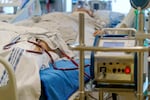Top officials with the four major health systems in the Portland metro area issued a fresh warning on Wednesday about the surge of COVID-19 cases that are straining resources statewide, burning out health workers and sickening unvaccinated people.
Statewide, over 1,000 patients are hospitalized with severe COVID-19.
Ninety-two percent of Oregon’s total hospital beds are in use, and 93% of the state’s ICU beds are being used.

The most critical patients are placed on extracorporeal membrane oxygenation, or ECMO, which removes blood from the patient, infuses it with oxygen, right, and the oxygen rich blood is recirculated to the patient’s body. Every bed on this intensive care unit at Oregon Health and Science University is critically ill with COVID-19 in Portland, Ore., Aug. 19, 2021.
Kristyna Wentz-Graff / OPB
Kaiser Permanente, OHSU, Legacy Health and Providence made the joint request for public assistance.
The health officials said the situation is increasing wait times in emergency departments and making it harder for them to provide care for acutely ill patients with conditions like heart attacks, strokes and sepsis.
“If you get sick and need the hospital, we may not have a bed,” said Dr. Mary Giswold, the associate medical director at Kaiser Permanente.
The health systems are predicting COVID-19 cases and hospitalizations will peak sometime in September, and begin to return to more normal levels in October. In the meantime, here are five things they’ve asked the public to do to preserve hospital and emergency department capacity for people who need it.
Get vaccinated against COVID-19.
With the delta variant spreading, it’s the surest way to keep yourself out of the hospital.
Eighty five percent of people hospitalized for lung failure and other complications of COVID-19 are unvaccinated. Kaiser, Providence and OHSU report about 90% of their COVID-19 patients on life support in the ICU are unvaccinated. Legacy’s numbers were even higher: 97%.
“Please do us this favor and go get vaccinated,” said Levi Cole, an ICU nurse with Portland Providence Medical Center.
If you are not vaccinated, stay home.
Avoid non-essential gatherings if you’re unvaccinated. Wear a mask, wash your hands, and spread out from others if you do need to be in public.
“Every mask, every vaccine, every attempt to limit gatherings is important at this time,” said Dr. Renee Edwards, the chief medical officer at OHSU. “If you are unvaccinated please stay home, so you do not put yourself and others at risk.”
Stay home if you feel sick — regardless of your vaccination status.
The delta variant is, scientists estimate, at least twice as transmissible as the wild-type original strain of COVID-19. The viral load of a single infected patient is as much as 1,000 times higher.
A person infected with the original strain of COVID-19 was capable of infecting, on average, two others if no precautions were in place. With the delta variant, a single infected person causes between five and eight other infections.
Vaccinated people can transmit the virus to other people, even though they’re less likely to get critically ill themselves.
So stay home if you feel sick, regardless of your vaccination status.
Don’t go to the emergency room to get tested for COVID-19
Hospital emergency departments are particularly overwhelmed. They’re facing “a perfect storm” of staffing shortages, people who delayed care earlier during the pandemic, and record numbers of COVID-19 patients.
On top of that, people are showing up in emergency departments to get tested for COVID-19.
There are lots of better places to get a test for COVID-19. This list of testing resources compiled by Multnomah County is a good place to start.
But do go to the emergency room if you really need it
The health systems are warning that patients with the delta variant can progress rapidly — and have a better shot at recovery if they come in earlier in their course of sickness.
They’re also diagnosing cancer patients whose diseases have progressed.
People experiencing medical emergencies shouldn’t hesitate to seek care.
